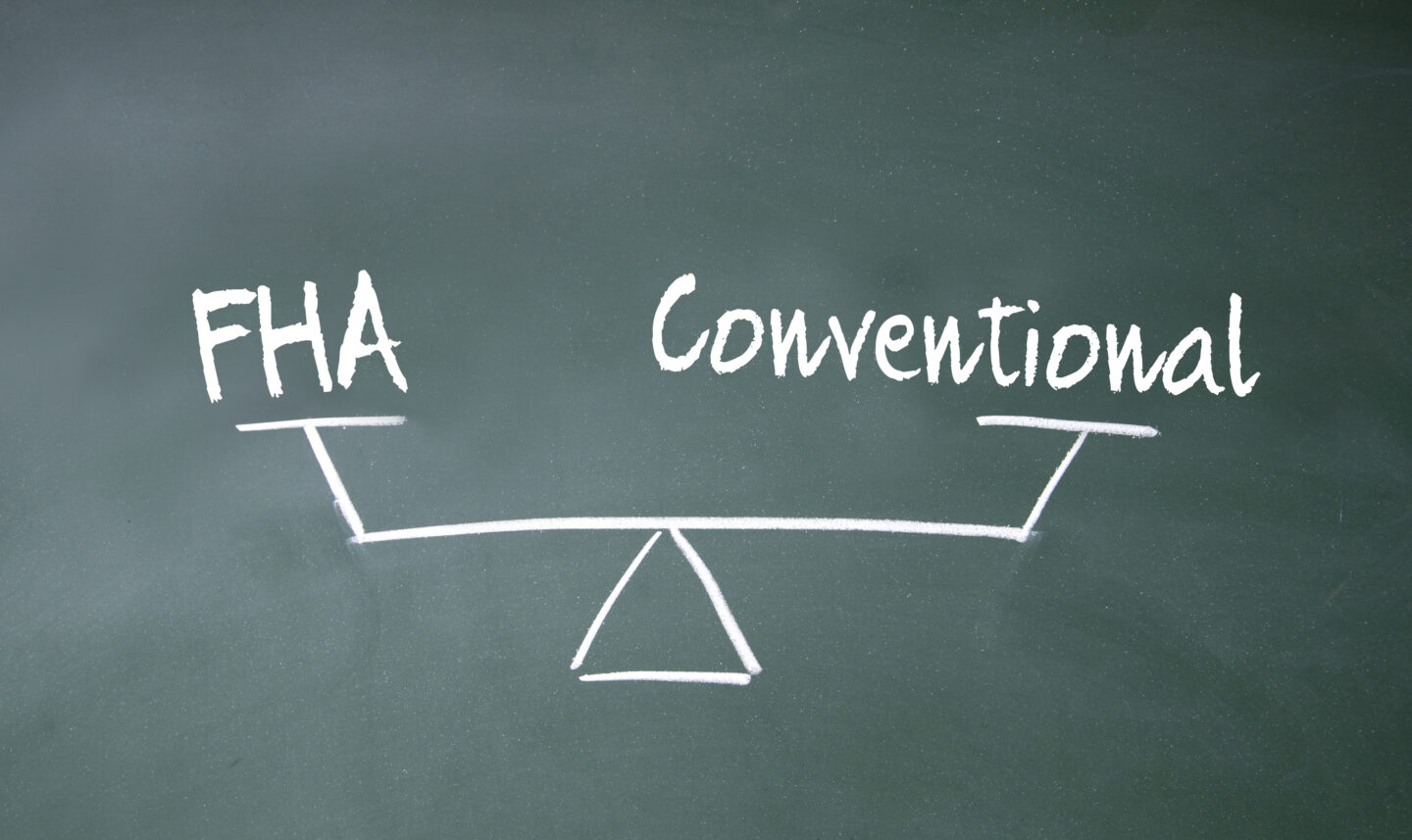FHA vs Conventional Loan: Pros, Cons & Differences
It may not always seem clear whether to apply for a FHA loan or conventional loan when purchasing a new home. Here are a few tips that may help you decide.


Written by Alycia Lucio on November 22, 2024
Different loan types come with varying terms, eligibility requirements, and costs. Whether you're a first-time home buyer or looking to refinance your current mortgage, knowing the ins and outs of FHA and conventional loans can save you money, time, and stress.
The differences between FHA and conventional loans
FHA and conventional loans are available to different types of borrowers based on an individual’s financial strength and credit profile. FHA loans are government-backed, meaning the Federal Housing Administration (FHA) insures them. This makes FHA loans more accessible to individuals with lower credit scores and smaller down payments. Conventional loans, however, are not backed by the government. They typically require higher credit scores and larger down payments, for this reason, but in exchange for more flexible terms and conditions.
Interest rates for FHA loans are often lower, but come with higher fees
Mortgage rates for FHA loans are typically lower than conventional loans, making them attractive to first-time home buyers. However, this doesn’t mean an FHA loan will be less expensive in the long run. Conventional loans might have slightly higher interest rates, but often have lower fees and closing costs than FHA loans — meaning the annual percentage rate (APR) is generally lower. This is because APR includes loan fees and interest to represent your total borrowing costs.
The max DTI for FHA loans is higher than conventional loans
Your debt-to-income ratio, or DTI, is the maximum amount of recurring debts you can have based on your gross monthly income while still qualifying for a home loan. DTI limits can vary depending on your lender. Conventional loan lenders generally accept a DTI of up to 50%, while FHA loan lenders may accept up to 55%. Lenders are more likely to accept a higher DTI when you make a down payment above the minimum, show a strong history of making payments on time, or earn a higher income.
FHA loans have more flexible credit score minimums than conventional
One key difference between FHA and conventional loans is their credit requirements. FHA loans generally have more lenient credit requirements than conventional loans, allowing applicants with scores as low as 580 to qualify, though some lenders may accept credit scores as low as 500 with a 10% down payment. Conventional loans usually require a minimum credit score of 620, although some lenders may prefer scores above 700 for the best rates and terms.
Some conventional loans accept lower down payments for first-time buyers
Another significant difference between FHA and conventional loans is the down payment minimum. FHA loans are known for their low down payment options, often as low as 3.5% of the home’s purchase price with a 580 or higher credit score. The lower your score, the more money you’ll need to put down. Some conventional loan lenders offer down payments as low as 3% for first-time home buyers, making them an equally competitive option. On average, conventional loan down payments start at 5% of the home’s purchase price. The more money you put down with either loan, the less you’ll need to borrow. Start saving for a down payment as soon as possible to kickstart your home buying journey.
Mortgage insurance is required for all FHA loans, but not all conventional
With FHA loans, you’ll pay an upfront mortgage insurance premium (UFMIP) in addition to an annual mortgage insurance premium (MIP), which is usually included in your monthly payments. The insurance remains for the life of the loan, unless you make a 10% down payment or refinance into a conventional loan. Conventional loans only require private mortgage insurance (PMI) if your down payment is less than 20%, and it can be canceled once you reach 20% equity in your home.
FHA loan limits are often lower than conventional loan limits
The Federal Housing Finance Agency (FHFA) sets limits on how much you can borrow with a FHA and conventional loan, which vary by location. FHA loan limits are generally lower than conventional loans, as they’re designed to help more low- to moderate-income earners become homeowners. Conventional loans offer higher loan limits, making them suitable for purchasing more expensive properties or investments.
Conventional loans have fewer property eligibility requirements than FHA
FHA loans tend to have more property eligibility requirements than conventional loans. FHA loans are primarily used to finance a primary residence, while conventional loans can be used to finance a primary, secondary or investment property. Both loan types require the property to be structurally sound and readily accessible, with no major defects or evidence of pest or mold infestation. However, properties such as condos must be FHA-approved to obtain an FHA loan. Regardless, both FHA and conventional loan lenders require a home inspection to ensure the property meets their eligibility requirements.
FHA loans are assumable; most conventional loans are not
FHA loans are assumable. This may be a particularly good future resale point if the borrower has an existing low interest rate on the home they are selling. A new buyer can assume that interest rate and mortgage balance. Conventional fixed-rate loans do not offer this feature.
The pros and cons of FHA loan vs conventional
The pros:
- FHA loans have lower credit requirements, allowing a minimum credit score of 500
- FHA loans have more flexible DTI requirements, allowing qualifying borrowers to have a DTI of up to 55%, while conventional loans only allow up to 50%
- FHA loans often come with lower interest rates than conventional loans
- FHA loans offer down payments as low as 3.5%, while conventional loans offer first-time homebuyers down payments as low as 3%
- FHA loans are assumable
- FHA loans are eligible for a streamline refinance — which is a cheaper and quicker way to refinance your loan in a low interest rate period
- Non-occupant co-borrower (relative) may be used for FHA loan qualification by blending ratios
The cons:
- FHA loans aren’t as flexible regarding property type, limiting homebuyers to a primary residence
- FHA loans require both an upfront and monthly MIP, lasting the life of the loan if you make a down payment of less than 10%
- FHA loans have lower loan limits than conventional loans
- Conventional loans are typically not assumable
Should I apply for an FHA or conventional loan?
Choosing between a FHA and conventional loan depends on your specific financial situation and homeownership goals. If you have a lower credit score or limited savings, an FHA loan might be the right choice. However, if you have a stronger credit score and can afford a larger down payment, a conventional loan could offer more favorable terms and cost less over the life of the loan. Check if you pre-qualify with us at Zillow Home Loans* to learn more about your options.
*An equal housing lender. NMLS #10287
How much home can you afford?
At Zillow Home Loans, we can pre-qualify you in as little as 5 minutes, with no impact to your credit score.
Zillow Home Loans, NMLS # 10287. Equal Housing Lender
Get pre-qualifiedHow much home can you afford?
See what's in reach with low down payment options, no hidden fees and step-by-step guidance from us at
Zillow Home Loans.
Zillow Home Loans, NMLS # 10287. Equal Housing Lender
Calculate your BuyAbility℠
Related Articles
Get a mortgage with Zillow Home Loans
Go from dreaming to owning with low down payment options, competitive rates and no hidden fees. A dedicated loan officer will guide you until you have your keys in hand.

Zillow Home Loans, NMLS #10287. Equal Housing Lender.



